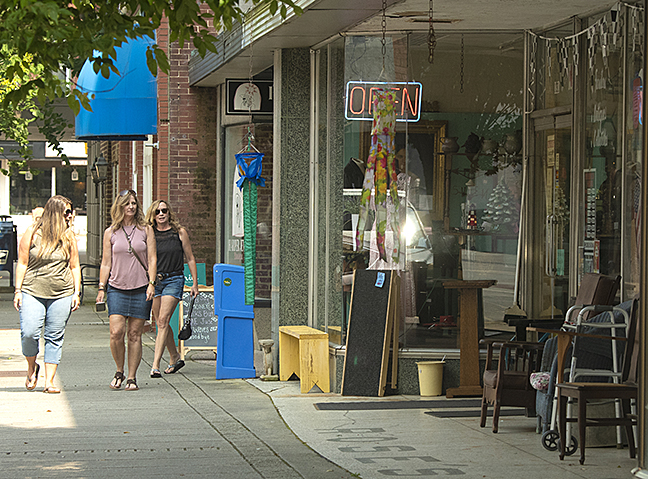Welcome!

From left, Merritt WIllson, Evden Blanton and Krys Williams, all from Winston-Salem, check out the stores on Sunset Avenue in downtown Asheboro on Friday. Eric Abernathy/Randolph Hub
City Council passes amended budget
ASHEBORO — After a couple of revisions over the past month, Asheboro’s proposed budget for 2023-2024 was approved by the City Council on June 26.
It wasn’t a document that anybody was pleased with. In fact, council member Bill McCaskill voted against it, primarily because of a property tax rate that went up by 4.5 cents per $100 of valuation, from 66.5 to 71 cents. The initial budget had a tax rate of 72 cents.
Finance Officer Debbie Reaves presented the revised budget to the council, which had been lowered from the initial $73,826,504 to $71,552,634. The portion to the General Fund is $48,737,069 while the self-funded Water and Sewer Fund is $22,815,565.
Some of the cuts in the appropriations will come from the current budget while others will be deferred to late 2023 or early 2024, when grant proceeds are expected. The cuts amount to more than $2 million.
The budget was amended after feedback from the public, Reaves said. Public safety, including the Police Department ($12,115,810), Fire and Rescue Department ($8,346,930), Fire Prevention and Inspection Department ($318,173) and Building Safety and Inspection Department ($294,891) make up 93.7 percent of the property tax revenue of $22,482,710.
Water/sewer rates and garbage collection fees will remain the same as currently charged.
Council member Clark Bell, noting that other nearby cities are increasing their tax rates, said, “I appreciate your work to lower the budget.” Kelly Heath said the budget was “agonized over.”
Eddie Burks commended the work on the budget, saying, “I couldn’t have found a penny (to cut). We can’t cut back on (salaries) any more because people will go elsewhere.”
Mayor David Smith said the City of Asheboro “continues to fight a battle over recruitment and retention (of personnel, particularly police and firefighters).”
City Manager John Ogburn said the city’s second source of revenue is sales taxes. For that reason, he said, people “need to shop in Asheboro.”
Walker Moffitt, mayor-pro-tem, said, “After public safety, there’s not a lot left. But we don’t want longer response times. He said the city is now in a post-industrial economy, having lost a number of textile mills over the past couple of decades. Our only real growth is limited to organic growth.”
Organic growth refers to increasing sales by relying on internal resources. The city has been doing that through such projects as promoting downtown, building the Zoo City Sportsplex and improving McCrary Ballpark.
“If we don’t have amenities — something to do — our young people will go to big cities,” Moffitt said. “With no organic growth, we’ll have a $1 tax rate. In one or two years, we could see (the 71-cent rate) as a bargain.”
Smith stressed the importance of public safety. “The most important call you’ll ever make is to 911,” he said. “We expect the police to be johnny-on-the-spot. They do a great job.” Also, Smith said, the city is working to build a third fire station for a department that recently received the top rating for fire departments, making it among the top 1 percent in the nation.
McCaskill, on the other hand, said, “I’ve never seen a (tax) hike this high. There are so many big capital projects going. We need to get them done then see where we’re going.”
Smith agreed, saying the city should complete the projects and then “take a breath. We didn’t intend for all of them at the same time. A couple couldn’t be put off. It’s unfortunate that we find ourselves in this position. Our needs on top of revaluation (of real property during the past year) make it very difficult. I”ve never had a budget so difficult.”
Bell made the motion to adopt the budget which Moffitt seconded. The motion carried 5-1, with McCaskill voting against.
